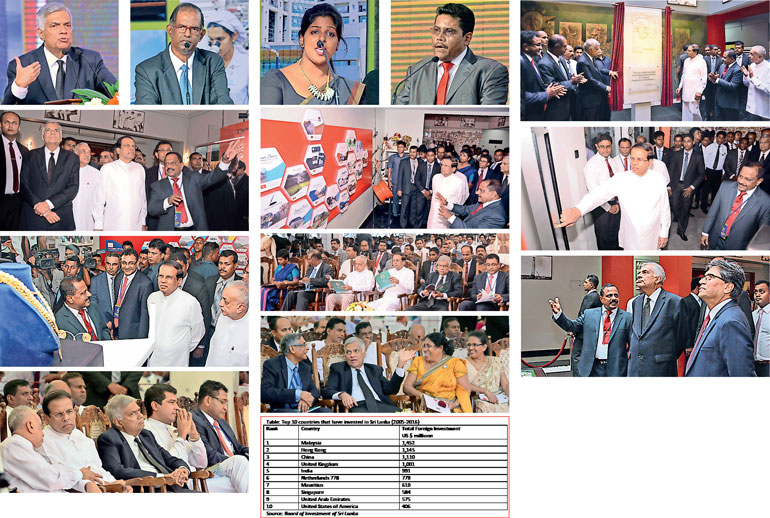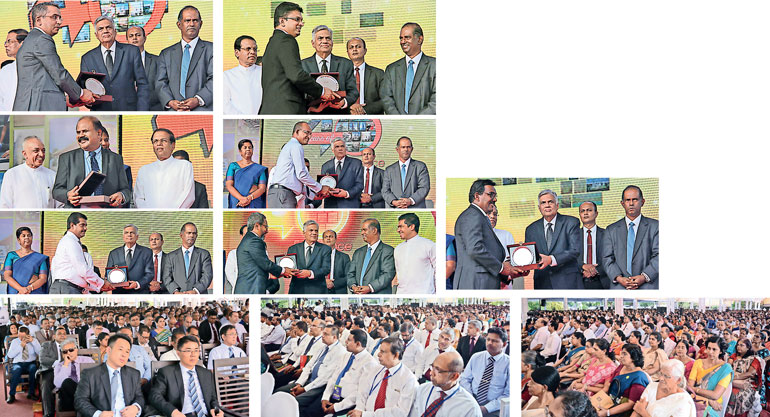Tuesday Feb 24, 2026
Tuesday Feb 24, 2026
Monday, 18 September 2017 00:00 - - {{hitsCtrl.values.hits}}
 The BOI celebrated the advent of its 40th year on Friday with a high-energy, colourful event that paid tribute to the country's investors and employees.
The BOI celebrated the advent of its 40th year on Friday with a high-energy, colourful event that paid tribute to the country's investors and employees.
The highlight of the event, held at the country's first Export Processing Zone (EPZ) in Katunayake, was the unveiling of a plaque, in honour of late President J.R. Jayewardene who launched the open economy after his election in 1977, by President Maithripala Sirisena and Prime Minister Ranil Wickremesinghe. Hosted by the BOI’s Chairman Dumindra Ratnayake and its Director General Duminda Ariyasinghe, the event was attended by Minister of Development Strategies and International Trade Malik Samarawickrama, State Minister of International Trade Sujeewa Senasinghe, ambassadors representing investor nations as well as senior members of the investor community.
The focus of the event was very much on foreign and local investors who have helped drive Sri Lanka from a largely rural and agro-based economy when economic reforms were launched in 1978 to the robust, export-driven economy of today, as well as on the contribution of employees of BOI companies, many of whom were part of the large crowd of nearly 5,000.
The President, Prime Minister and other dignitaries handed over awards of recognition to the top 40 BOI companies and longstanding employees of BOI companies and of the BOI itself who have served a tenure of over 35 years. The top BOI companies were selected based on their cumulative investment, exports, employment and tenure.
In his speech, Prime Minister Wickremesinghe recalled the strategic vision which resulted in Sri Lanka being the first Asian country to open up its economy, though its position has now been surpassed by others in the region, primarily due to the disruption caused by civil conflict.
He went on to emphasise the responsibility of all those present in repositioning Sri Lanka as a regional economic force. The PM, who was present at the launch of the Katunayake zone and later spearheaded the launch of the second BOI zone in Biyagama, said that the country was now placed in the best position in recent times to capitalise on its strategic location and improved international relations to drive the economy forward.
One of the high points of the event was the rousing speech by a young employee of the Katunayake zone from Star Garments, Diana Heshani Perera, who thanked the BOI for creating around 500,000 job opportunities for Sri Lankan youth, especially young women, who have been gainfully absorbed into the economy.
Describing her own career progress, Perera busted many of the myths about zone employees created in the media and said there was no better way to contribute to Sri Lanka's economic rise while developing one's own career.
The Secretary of the Free Trade Zone Manufacturers Association, Dhammika Fernando, highlighted the significant economic contribution made by companies operating within the EPZs, and thanked the BOI for its proactive management of investor issues.
The welcome address was delivered by BOI Chairman Ratnayake, who warmly greeted the large gathering of religious dignitaries, ministers and MPs, trade union leaders, past heads and retired employees of the BOI. The vote of thanks was delivered by Director General Ariyasinghe.
BOI companies contribute over 70% of Sri Lanka's overall exports and over 85% of the country's industrial exports. They have brought in a cumulative $ 14 billion in Foreign Direct Investment (FDI).
40 years of Board
of Investment
Since its establishment in 1978, the BOI has contributed immensely to the Sri Lankan economy by means of enhanced export earnings, diversification of the export base, creation of employment opportunities, transfer of advanced technology and skills, local skills development, infrastructure development, rural development and poverty reduction.
With 1,700 projects in commercial operation and providing almost half a million employment opportunities, the BOI remains a significant change agent in transforming Sri Lanka’s economy from a largely agrarian base into the modernised, manufacturing- and services-based platform it is today.
Among the top 10 countries that have invested in Sri Lanka are countries from the Asian region including Malaysia, Hong Kong, China, India and Singapore.
Industries operating under the BOI contribute over 70% of the country's total export earnings and 85% of the national industrial export earnings.
New products include garments, machinery, electronics and electrical accessories, automotive components, rubber, plastics, ceramics and related products and building equipment. In 2016, export earnings from the apparel industry exceeded $ 4 billion. Sri Lanka has become a major supplier of apparel to the United States and the European Union, representing 87% of total apparel exports in 2016.
Agricultural exports limited to primary products were gradually converted to value-added products and manufacturing industries. As a result, foreign exchange earnings from agricultural products have also increased.
The export of tea in consumer packets or tea bags, rubber tyres and tubes, coconut-based products such as mattresses and rugs are popular examples. Sri Lanka has also become the global market leader in solid tyres. Camso Loadstar, a leading global solid tyre manufacturing company, undertakes its manufacturing business in Sri Lanka.
The BOI has greatly facilitated the generation of employment as foreign investments generate a large number of employment opportunities. This is mainly done through investments in manufacturing industries and service sectors. To date BOI approved investment projects have created about 500,000 direct employment opportunities. Female employees represent a higher percentage than male employees in the BOI projects. Out of the total number of employees in the EPZs operating under the Board of Investment of Sri Lanka, 57% comprise female employees.
Furthermore, there are many forms of indirect employment opportunities and income generating activities that have been created by investment projects of the BOI. Providing lodging facilities for the employees of the export processing zones, providing transport services and opening shops are a few examples.
Among the investment projects operating under the BOI, a high level of investments can be seen in specialised manufacturing industries, the communication sector, tourism sector, logistic services, knowledge services and infrastructure sector projects. In specialised manufacturing industries one of the most highly specialised segments is the production of sensors for aircrafts and export to the world market. These devices are also exported to Europe and the US for Airbus 330. Factors such as the high quality of the product and 100% accuracy have paved the way for these products to be exported to companies holding world famous brand names.
The maritime cable system (SEA-ME-WE 5), which is connected to 17 countries worldwide, covers a wide spectrum of the telecommunication industry. This new cable system has become a major factor to get effectively connected to internet services. Based on the support of SEA-ME-WE 5, Sri Lanka expects to achieve the digital social goals of ‘SMART 2020’ and also become the most attractive data management centre in the region by 2020.
Travel and tourism
and logistics
The travel and tourism and logistics sectors are segments with high potential for new investment and the creation of job opportunities. Many world-renowned brands in both of these sectors are in the process of expanding their business operations in Sri Lanka.
The BOI has also identified the knowledge services sector as a high potential sector for attracting investment and creating employment opportunities of a high standard. A number of internationally reputed companies in this sector are already operating businesses in Sri Lanka under the BOI’s facilitation. A trend of attracting youth towards the knowledge services sector can be expected by creating job opportunities for youth with higher educational qualifications through investment in projects in this sector.
Contd. on Page 17
BOI celebrates 40 years...
With regards to infrastructure, many power projects have already been started with foreign investment in the infrastructure sector. In addition, large-scale infrastructure projects such as the port development and construction of highways undertaken in partnership with the Government have had a great impact on attracting foreign investment.
The Colombo harbour handles over 5 million 20-foot TEUs of cargo annually with the services of four container terminals. The Colombo Port is ranked as the 23rd best port on the Alphaliner Index 2017.
The strategic geographical positioning of Sri Lanka in the region is a highly beneficial factor when undertaking transportation within Asia and to European countries within a minimum time period.
The Board of Investment of Sri Lanka currently provides services to about 1,700 investment projects to operate their business. The BOI staff provide effective services throughout from the point of start-up to operating one’s business, providing all facilitation and protection.
The staff provided by the BOI comprise professionals such as lawyers, engineers, accountants and economists as well as graduates and postgraduate qualified executive officers. The Board of Investment of Sri Lanka is the only investment promotion agency in South Asia that directly provides custom services to investors, thus making the BOI special in its facilitation service.
BOI staff have also been privileged to be part of training programs conducted by Harvard University’s Centre for International Development, Mc Kinsey Consulting and the World Bank Group.
The Board of Investment of Sri Lanka has given priority to attract foreign investment to achieve the development goals set out in line with the Government's economic strategies.
Accordingly, the establishment of six new investment zones by 2020 is a main target. Promotion activities are under way to attract investors to establish carefully selected industries in the new zones and also to invest in the new service sectors.
Enhanced national exports of the country by producing new goods and services for export and creating employment opportunities of high standard are the other targets of these investments. The Board of Investment in Sri Lanka is at the forefront of contributing to the sustainable development of the country by generating suitable employment opportunities for educated youth and thereby increasing their standard of living.
The BOI has commenced introducing a new business model, the first being the signing of an Agreement of Expressing of Interest with an investor to develop a new export processing zone in Milleniya in the Kalutara District. What is significant about this model is that the investor is responsible not only for the development of the zone but also for attracting new investors to the zone.
The BOI is also taking steps to attract more investment through bilateral free trade agreements with India and Pakistan. Expectation for attracting new investments will be further enhanced by the prospective bilateral free trade agreements proposed to be signed between China and Sri Lanka, as well as Singapore and Sri Lanka, in the near future.
“The Board of Investment of Sri Lanka is committed to be an active partner in the country’s economy and play its role as the engine of growth,” said Chairman Ratnayake.
